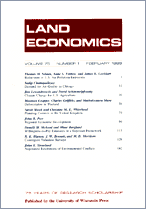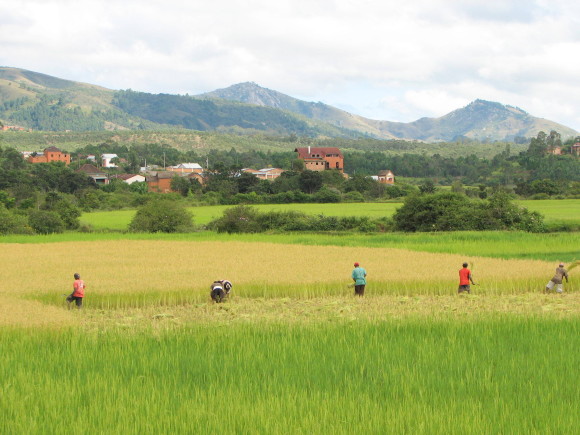 Land Economics has now published my article on the productivity impacts of land rights in Madagascar, which is creatively titled “The Productivity Impacts of Formal and Informal Land Rights: Evidence from Madagascar.”
Land Economics has now published my article on the productivity impacts of land rights in Madagascar, which is creatively titled “The Productivity Impacts of Formal and Informal Land Rights: Evidence from Madagascar.”
Here’s the abstract:
This paper studies the relationship between land rights and agricultural productivity. Whereas previous studies used proxies for soil quality and instrumental variables to control for the endogeneity of land titles, the data used here include precise soil quality measurements, which in principle allow controlling for the unobserved heterogeneity between plots. Empirical results suggest that formal land rights (i.e., land titles) have no impact on productivity, but that informal land rights (i.e., landowners’ subjective perceptions of what they can and cannot do with their plots) have heterogeneous impacts on productivity.
In other words, what I find is that no matter how you slice the data, land rights do not appear to have the beneficial effect many people seem to think they have. The emphasis is mine, for reasons that are perhaps best explained in the last paragraph of the paper:
[T]he US government’s Millennium Challenge Corporation signed a $110 million, four-year compact with the government of Madagascar in 2005 which included an important land tenure component, and whose goal was to “increase land titling,” and thus land security (Millennium Challenge Corporation 2010). But in a context where land titles do not seem to have improved agricultural productivity, the finding that land titles do not have such an impact is highly relevant for policy in that it helps knowing where to allocate aid dollars at the margin. Here, it looks as though aid might be better allocated to a reform of the legal framework within which agriculture takes place. Policy should be based on empirical evidence — not theoretical beliefs.
At the end of the day, the land titles in those data appear to be worth no more than the paper they are printed on.
What’s interesting to me about these findings, in light of my evolving research interests, is that many others find that land rights have beneficial effects on productivity. Generally speaking, however, it looks as though those beneficial effects of land titles are found in former British colonies in Africa. In former French colonies such as Madagascar, however, it looks as though land titles have no impact. This brings to mind a passage from Herbst’s States and Power in Africa:
France was notable for its unusually unsuccessful efforts to disrupt customary tenure during the colonial period, despite its sweeping laws that theoretically made wholesale changes in land tenure (…) France relied on administrative fiat to try to change customary tenure procedures.
Does anyone know of a study looking at the differential approaches to or impacts of British vs. French colonial institutions dealing with land tenure issues? I think there would be a neat paper to be written on that.

African Institutions and the Endangered Species Act
From an op-ed I published in the Star Tribune (Minneapolis–St. Paul) this past weekend: